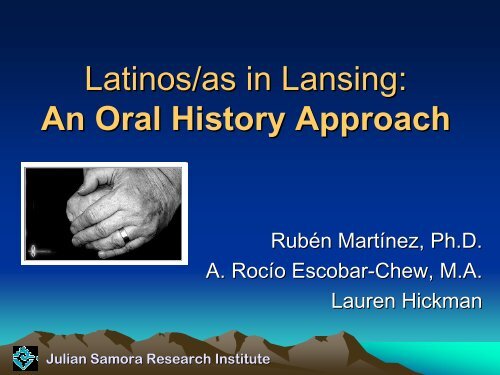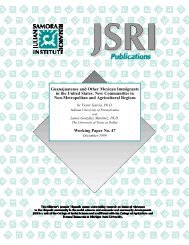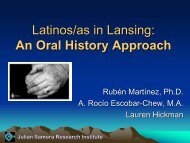An Oral History Approach - Julian Samora Research Institute
An Oral History Approach - Julian Samora Research Institute
An Oral History Approach - Julian Samora Research Institute
You also want an ePaper? Increase the reach of your titles
YUMPU automatically turns print PDFs into web optimized ePapers that Google loves.
Latinos/as in Lansing:<br />
<strong>An</strong> <strong>Oral</strong> <strong>History</strong> <strong>Approach</strong><br />
<strong>Julian</strong> <strong>Samora</strong> <strong>Research</strong> <strong>Institute</strong><br />
Rubén Rub n Martínez, Mart nez, Ph.D.<br />
A. Rocío Roc o Escobar-Chew, Escobar Chew, M.A.<br />
Lauren Hickman
Acknowledgements…<br />
• Thank you to Dr. Rubén Martínez, Ph.D<br />
(Ruben.Martinez@ssc.msu.edu) for his guidance and the great<br />
opportunity of being involved in the OHLM project.<br />
• Thank you to the <strong>Julian</strong> <strong>Samora</strong> <strong>Research</strong> <strong>Institute</strong> for the<br />
research and funding opportunity.<br />
• Special thanks to Dr. Pilar Horner (phorner@msu.edu) for her<br />
valuable feedback and support in the development of the<br />
qualitative analysis of this project and the ideas for this<br />
presentation.<br />
• Thank you to Dr. Marsha Carolan (carolan@msu.edu) for her<br />
time revising this presentation as well as the important feedback<br />
she provided.
Purpose of the Study<br />
• Identify patterns of The Settlement Process* of Latinos/as in<br />
Lansing:<br />
– Settling Out - factors that contributed to leaving the migrant<br />
lifestyle.<br />
– Settling Down- factors that influenced where they settled (i.e.:<br />
social networks and kinship connections).<br />
– Settling In - factors that influenced their participation in secondary<br />
organizations (outside of the family).<br />
* Settlement frameworks (Provinzano, 1974; Piore, 1986; Massey,<br />
1986; Logan, 1991; Green, 1994)<br />
• This presentation includes the preliminary findings from 4 of 18 oral<br />
history interviews completed so far in this ongoing research project.
<strong>Oral</strong> <strong>History</strong>… <strong>History</strong><br />
• “The systematic collection of living people's testimony<br />
about their own experiences.” (Moyer, 1999).<br />
• The process of analysis that follow includes locating the<br />
histories in their appropriate context by corroborating the<br />
facts and analyzing the data. (Moyer, 1999).<br />
• <strong>An</strong>other piece of our project is concerned with the<br />
collection of historical records from participants, such as<br />
photographs, certificates, pamphlets from Latino past<br />
organizations developed in the area, etc.<br />
• These materials are becoming part of the JSRI museum<br />
collection, helping to document the contributions of<br />
Latinos/as to this community.
Participants<br />
• Senior Latinos/as residing in the area of<br />
Lansing, Ingham County (n=18).<br />
• Ages between 57-89 years of age.<br />
• 9 females, 9 males.<br />
• Majority were migrant workers.<br />
• Mexican, Mexican-American (Tejanos),<br />
and from other Latin-American countries.
Method<br />
• Design: Narrative Study.<br />
• Recruitment:<br />
– Key Informants (community leaders access to<br />
social groups and organizations).<br />
– Snowball sampling (trust).<br />
– Self-selecting sample (volunteered).<br />
• Data Collection procedures: <strong>Oral</strong> history<br />
interviews and collection of artifacts.<br />
– One-on-one interviews, minimum: 2 hours long,<br />
participant’s residence or organization.
Method (Cont. )<br />
• Criteria: purposive sample (50 year or older/ at<br />
least 3 years living in MI).<br />
• Data <strong>An</strong>alysis: Inductive/Deductive inquiry.<br />
• Interviewer/researcher location: shared<br />
ethnicity, educational attainment, migration<br />
status, age, outsider/insider.
Preliminary Sample Description<br />
• 2 females and 2 males:<br />
– 1 female and 2 males are former migrant workers<br />
(Rosa, Felipe, and Carlos)*.<br />
– 1 female emigrated from TX to MI, but not as a<br />
migrant worker (Dora)*.<br />
* Real names were replaced with Pseudonyms to protect<br />
participants’ privacy.
Pseudonym Year<br />
Born<br />
Demographics<br />
Gender Status Children Education<br />
Rosa 1932 F Widow 11 Elementary<br />
Felipe 1937 M Married 4 B.A. Admin.<br />
Former<br />
Occupation<br />
Field &<br />
Factory<br />
Worker<br />
Elected<br />
official &<br />
NPO<br />
Manager<br />
Carlos 1933 M Married 5 Elementary Field worker /<br />
Private<br />
Business<br />
Dora 1922 F Widow 8 College (1yr)<br />
Ever a<br />
migrant<br />
Worker<br />
?<br />
Place<br />
of<br />
Birth<br />
Came<br />
to<br />
MI<br />
in<br />
Yes MX 1992~<br />
Yes MX 1952~<br />
Yes MX 1955<br />
NPO<br />
Commissioner No TX 1946
What did we asked?<br />
• Open ended interview guide with a total of 51 questions<br />
(no. of questions varied according to being a migrant<br />
worker or not). The guide was divided in 3 basic phases:<br />
Settling out:<br />
• How was your life as a migrant worker?<br />
• How did you happen to come to live in MI?<br />
Settling in:<br />
• What where your early experiences in MI?<br />
Settling out:<br />
• At what point did you became active in church, politics,<br />
schools (etc.)?
• The Migrant Lifestyle:<br />
– Common experiences:<br />
Results<br />
• Life of hardship: “Los trabajos were too difficult, you suffer riding in<br />
the back of the trucks.” “We didn’t have bathrooms.” –Felipe<br />
• Constant mobility: “[My grandparents] followed the crops every year<br />
for 9 months.” –Carlos<br />
• School interrupted: “[My parents didn't let me] go to school until<br />
the harvesting season ended”. –Felipe<br />
– Contrasting experience:<br />
• Enjoyment: “We liked traveling and working on la labor. We made it<br />
sort of a game. I was with my children, I was happy.” –Rosa.
• Settling out:<br />
– Common experiences:<br />
Results<br />
• Social networks were essential “I knew of a family that came<br />
and lived in Lansing, he worked for GM. So I came looking for<br />
him.” – Carlos<br />
• Factory work, railroad (language skills/education). “Because I<br />
didn’t had enough education, I went to [factory name]”, they pay<br />
you well. –Carlos.<br />
– Contrasting experiences:<br />
Smoother transition: “We (participant and his parents) came with<br />
everything set up because my brothers already had a house, a<br />
car, and spoke English” –Felipe.
Results<br />
• Settling out:<br />
– Common experiences:<br />
– Reasons for leaving the migrant stream:<br />
• Improve their quality of life: “We were real poor. We<br />
had no insurance, no benefit, nothing.” –Carlos<br />
– Psychological detachment from the migrant stream: stream<br />
- “When I was 18 years-old, I was able to apply for a job by<br />
myself. Then I said: “Yo me salgo” (I’ll leave [the migrant<br />
stream]) –Felipe.<br />
- “When I was 16 years-old I said: I don’t want to do this.<br />
This is not for me. I wanna do something different.<br />
–Carlos.
Results<br />
• Settling out:<br />
A Contrasting experience:<br />
– [Due to my husband’s infidelity] I decided to<br />
separate from him. That is why I came here.<br />
Then my son got an operation here. When I<br />
came to Lansing I was disabled (back lesion). I<br />
received disability and had to stop working. It’s<br />
sad. I didn’t really came to stay, but I ended up<br />
staying here up until today. –Rosa.
Results<br />
• Settling down: Common C experiences:<br />
• Pioneers: “When I first came there weren’t many Latinos” – Carlos & Dora.<br />
• Why Lansing?: “Lansing is a good city to live in. Compared to Detroit and<br />
Flint, is more peaceful here.” –Carlos<br />
• Role of social/religious organizations: “I started feeling more as part of<br />
the community when I was invited to the church” –Rosa<br />
• Acculturation: “All my children were born in MI. First, they don’t speak<br />
Spanish. I told them: “You have to speak both languages. Spanish is your<br />
language too.” –Carlos<br />
• Language barriers (English with other non-Latino/a): “I don’t know why<br />
these gringos don’t understand what I am saying!” -Felipe. “I taught<br />
myself English by reading the [Lansing] State Journal” –Carlos.
Results<br />
• Settling down:<br />
– Contrasting experiences:<br />
-Language barriers (English with other Latinos/as) “Many people that<br />
know Spanish speak to you in English.” –Rosa.<br />
-“A lo hecho ya”: “We (participant and his parents) came with<br />
everything set up because my brothers already had a house, a car,<br />
and spoke English” –Felipe.<br />
-Experiences of discrimination: “We haven’t feel any marked<br />
discrimination over here [like the one] I have seen in Texas” -Dora
• Settling in:<br />
– Common experiences:<br />
Results<br />
-Leadership role: “I was very much involved in many things with<br />
people, the beginning of Lansing with the Mexican people.” –Dora.<br />
– Expanded social network: “The only way in which one can help<br />
our people is to get into politics, get in the newspapers, get into<br />
the radio.” –Felipe.<br />
– Giving back to the community: I left my job, I thought about the<br />
opportunity, and the fact that I could do more for our people [as a<br />
NPO manager].” –Felipe.<br />
– Contrasting experience:<br />
-No interested in leadership: “They offered me the [elected official<br />
position] , but I didn’t wanted to. It’s too time-consuming.” –Carlos.
Giving back<br />
to the<br />
Community<br />
Community Level<br />
Settling Down<br />
(Leadership)<br />
Migrant Stream<br />
Settling Out<br />
Settling In<br />
Individual &<br />
Family Level<br />
Model<br />
Migrant Stream
Giving back<br />
to the<br />
Community<br />
Community Level<br />
Settling Down<br />
Ambition/Intention<br />
By chance/unplanned<br />
(Leadership)<br />
Migrant Stream<br />
Expanded<br />
Social<br />
networks<br />
Social<br />
contacts<br />
Settling Out<br />
Settling In<br />
Owned<br />
businesses<br />
Leadership roles<br />
Pioneers<br />
Later<br />
settlers<br />
Social Activism<br />
Migrant Stream<br />
Model<br />
Social networks<br />
Factory/Railroad<br />
Employment<br />
Diverse transitions<br />
(easy...challenging…all positive)<br />
Language barriers<br />
Individual &<br />
Family Level
<strong>Research</strong> Challenges<br />
• Careful historic review of the facts and the<br />
context of migrant workers and the background<br />
of Latinos/as in Michigan.<br />
• The abstract nature of the oral histories allow to<br />
explore people’s idiosyncratic experiences in<br />
their particular context and at a specific time<br />
(Portelli, 1991).
Discussion<br />
• In the process of restorying (Creswell, 2007) the field text<br />
from the interviews we discovered that:<br />
– Settlement process is an overlapping process that<br />
develops in a upward spiral, in a circular fashion.<br />
– Starts from an individual/family (tight social network)<br />
level and develops into a community level (expanded<br />
social network), as the individual/family integrates to<br />
her/his settlement context.
Conclusions<br />
• The settlement process of Latino/a migrant<br />
workers in Lansing can be understood using<br />
the Settlement Phases Model (Provinzano, 1974; Piore,<br />
1986; Massey, 1986; Logan, 1991; Green, 1994)<br />
– Settling out (Estableciéndose fuera),<br />
– Settling down (Estableciéndose en la vecindad),<br />
– and Settling in (Estableciéndose en la<br />
comunidad).
Conclusions (cont.)<br />
Within this 3-phase process we find diversity in terms of:<br />
– Settling out: different reasons leaving the migrant<br />
stream (shaped by context, family, by chance,<br />
unexpected life events).<br />
– Settling down: common and contrasting challenges<br />
and opportunities when settling down.<br />
– Settling in: a continuum of social and community<br />
involvement levels.
References<br />
• Creswell, J. W. (2007). Qualitative Inquiry & <strong>Research</strong> Design. Choosing Among Five<br />
<strong>Approach</strong>es. (2nd. Ed.). United States: Sage Publications.<br />
• Davis, A. (2008). Uncovering the Lives of Women in Post-War Oxfordshire: <strong>An</strong> <strong>Oral</strong><br />
<strong>History</strong> <strong>Approach</strong>. Rural <strong>History</strong>, 19(1), 105-121.<br />
• Green, S. (1994). Working Paper No. 19. <strong>Julian</strong> <strong>Samora</strong> <strong>Research</strong> <strong>Institute</strong>.<br />
• Logan, P. (1991). Examining the characteristics of resettled migrant farm workers and<br />
factors that have influence them to leave the migrant stream (Doctoral dissertation)<br />
North Carolina State University, Raleigh, NC.<br />
• Massey, D. (1986). The settlement process among Mexican migrants to the United<br />
States. American Sociological Review, 51, 670-684.<br />
• Moyer, J. (1993). Step-by-Step Guide to <strong>Oral</strong> <strong>History</strong>. Retreived on October 26, 2009<br />
from http://dohistory.org/on_your_own/toolkit/oral<strong>History</strong>.html<br />
• Piore, M. (1986). The Shifting Grounds of Immigration. <strong>An</strong>nals of the American<br />
Academy of Political and Social Science, 485, 23-33.<br />
• Provinzano, J. (1974). Settling Out and Settling In. Paper presented at the American<br />
<strong>An</strong>thropological Association <strong>An</strong>nual Meeting. (p. 12)<br />
• Portelli, A. (1991). The Death of Luigi Trastulli and Other Stories: Form and Meaning<br />
in <strong>Oral</strong> <strong>History</strong> (p. 50.)







